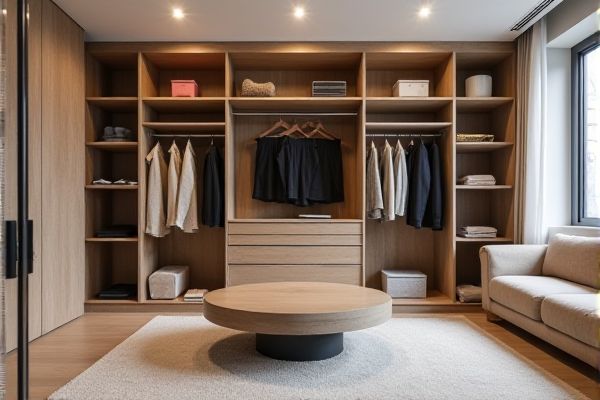
Smart closets offer automated features like inventory tracking and outfit suggestions to simplify your daily routine, while modular closets provide customizable layouts tailored to your storage needs. Explore the article to discover which closet system best suits your lifestyle and enhances your space efficiency.
Table of Comparison
| Feature | Smart Closet | Modular Closet |
|---|---|---|
| Definition | Closet integrated with technology for automated organization and outfit suggestions. | Closet made of customizable modules for flexible configuration and easy assembly. |
| Technology | Includes sensors, AI, and apps for inventory tracking and recommendations. | No built-in technology; purely physical and manual adjustments. |
| Customization | Smart features adapt based on usage and preferences. | Highly customizable layout using interchangeable components. |
| Installation | Requires professional setup for tech integration. | Usually easy DIY installation with modular parts. |
| Cost | Higher initial investment due to technology. | Moderate cost based on components chosen. |
| Maintenance | Needs software updates and occasional tech support. | Low maintenance; mainly cleaning and physical upkeep. |
| Use Case | Ideal for tech-savvy users seeking convenience and efficiency. | Best for users wanting flexibility and simple organization. |
Introduction to Smart Closets and Modular Closets
Smart closets integrate technology such as automated lighting, inventory tracking, and app connectivity to enhance wardrobe organization and accessibility. Modular closets consist of customizable, interchangeable components that adapt to changing storage needs and spatial constraints. Both solutions offer innovative approaches to maximizing closet efficiency but differ in their reliance on technology versus structural flexibility.
Key Features of Smart Closets
Smart closets integrate advanced technology such as automated inventory management, climate control, and AI-driven outfit recommendations, enhancing user convenience and wardrobe organization. These systems often include sensors, RFID tags, and mobile app connectivity for real-time tracking and personalized style suggestions. Unlike modular closets, smart closets emphasize intelligent functionality and digital interaction, transforming traditional storage into an innovative fashion management tool.
Essential Components of Modular Closets
Modular closets consist of essential components such as adjustable shelves, customizable drawers, and versatile hanging rods that allow you to tailor the space to your storage needs. These components offer flexibility to rearrange or expand the closet configuration, maximizing organization and efficient use of space. Unlike smart closets, which focus on technology integration, modular closets prioritize physical adaptability through interchangeable parts.
Technology Integration in Smart Closets
Smart closets incorporate advanced technology such as automated lighting, climate control, and inventory management systems that utilize sensors and AI for personalized organization. These features enable real-time tracking of clothing items, outfit suggestions, and seamless integration with smart home devices for enhanced convenience. In contrast, modular closets emphasize customizable physical components without incorporating significant technology integration.
Customization Options for Modular Closets
Modular closets offer extensive customization options, allowing users to tailor storage components such as shelves, drawers, and hanging rods to fit specific needs and available space. These systems provide flexibility in design, enabling easy reconfiguration or expansion without major renovations, which enhances long-term adaptability. Smart closets primarily focus on automated features, whereas modular closets emphasize personalized layout and functional customization for optimized organization.
Space Optimization: Smart vs Modular Closets
Smart closets utilize advanced technology like sensors and automated systems to maximize space by customizing storage based on your daily habits and wardrobe size. Modular closets offer flexible, reconfigurable components that can be adjusted or expanded manually, providing adaptable storage solutions for changing needs. Your choice depends on whether you prioritize tech-driven space optimization or hands-on customization.
Installation and Maintenance Comparison
Smart closets feature advanced technology with automated systems that often require professional installation and periodic software updates, ensuring seamless integration and optimal performance. Modular closets, designed for easy customization, generally allow for straightforward self-installation and flexible rearrangement, making maintenance simpler and less dependent on technical expertise. Choosing your ideal closet depends on whether you prioritize high-tech convenience with professional support or practical adaptability with minimal upkeep.
Cost Analysis: Smart Closets vs Modular Closets
Smart closets generally carry higher initial costs due to integrated technology like automated lighting, inventory tracking, and smartphone connectivity, often ranging from $2,000 to $10,000 depending on customization. Modular closets offer more budget-friendly options, typically priced between $500 and $3,500, emphasizing flexibility and ease of installation with adjustable shelving and components. When considering long-term value, smart closets can reduce accessory replacement costs and improve organization efficiency, whereas modular closets provide cost-effective scalability and easier upgrades.
Sustainability and Eco-Friendliness
Smart closets optimize space and reduce waste by incorporating technology that encourages efficient organization and minimizes the need for excess furniture, promoting sustainability in modern homes. Modular closets use eco-friendly materials like bamboo and recycled wood, allowing customization without generating significant waste, enhancing their eco-friendliness. Both systems contribute to sustainable living by supporting resource conservation and reducing environmental impact through thoughtful design and material choices.
Which Is Right for You: Smart Closet or Modular Closet?
Smart closets offer advanced automation features like inventory tracking, climate control, and outfit suggestions, ideal for tech-savvy individuals seeking convenience and efficiency. Modular closets provide customizable storage solutions with adjustable shelves, drawers, and compartments, perfect for those who prioritize flexibility and personalized organization. Choosing between a smart closet and modular closet depends on whether you value integrated technology or adaptable physical design in your wardrobe management.
 homyna.com
homyna.com